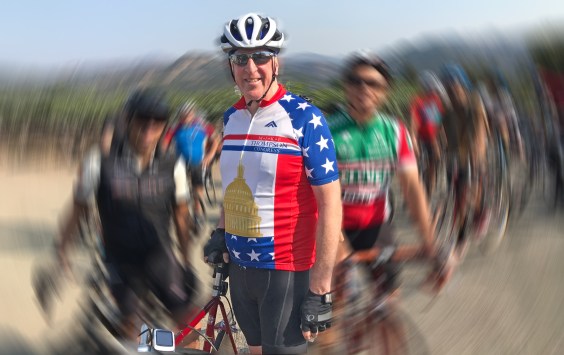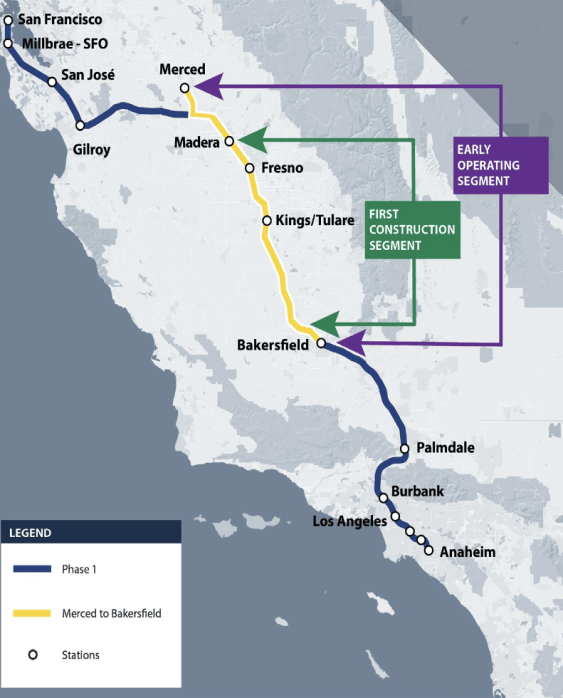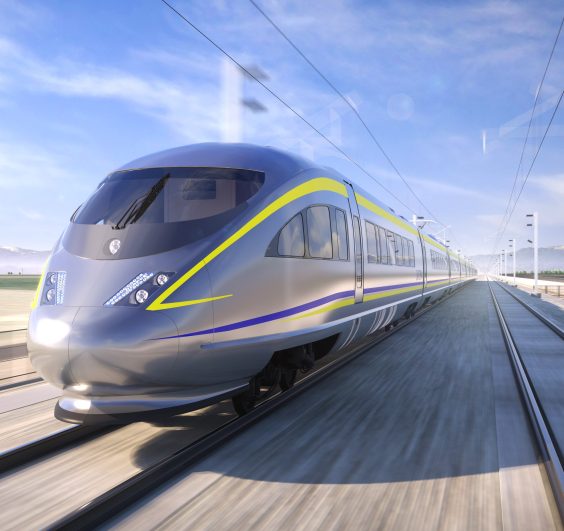Jack Fleck on Market Street, Muni, Global Warming and Traffic
11:31 AM PDT on July 8, 2010
 Photo: Bryan Goebel.
Photo: Bryan Goebel. What does San Francisco's retired top traffic engineer think about Market Street, Muni and global warming? We sat down with Jack Fleck recently for an extended interview. The 62-year-old retired last week after more than 25 years with the former Department of Parking and Traffic and the current San Francisco Municipal Transportation Agency (SFMTA).
Fleck expounded on a number of topics and his answers offer some insight into his thinking over the years as the city's lead traffic engineer.
On cars and driving:
As a student I started connecting all these problems with the automobile and the first one was related to the urban riots, I mean the fact that at that time equal housing laws didn't exist. So, African Americans were pretty much confined to the inner city, at the same time the freeways were crisscrossing the cities and making them much less livable, destroying neighborhoods and creating noise and pollution and all of that, and they became like pressure cookers and they exploded, and so the inner city blight and the white flight were something I paid a lot of attention to in the '60s. But then also reading Jane Jacob's book, "The Death and Life of Great American Cities," and how she contrasted Robert Moses, who was the big freeway builder. His vision of how the freeway was always good versus the reality, and not just freeways, but parking lots and widening streets and all the things that she talked about to create the fabric of a city and the way that the automobile was part of the problem. It wasn't like that was the only problem, but that was something she talked a lot about and I learned the word 'livability' I think from Don Appleyard when I took classes at Berkeley. I went to grad school in City Planning at Berkeley.
So that sort of struck home as that's what I want to do, make cities livable and I don't know that it was really a word that was used a lot until more recently, but it does make sense. That's from all the days that I've been involved in this is trying to make this city a better place to live. But then there were other problems with cars obviously, the wars for oil and I think I learned the word ecology in about 1969, it was the first time I heard that word. I was like 'oh, that's a good one', because air pollution, oil spills which obviously are still a problem. So all of that sort of compounded to make me much more anti-automobile, but still, I was like 'yes, cars are still convenient and people love cars.' I was never a person that loved cars like they were my baby or something, like some people their whole identity is caught up in their cars and that's still true today, but they are very convenient to get around and so it's a love/hate thing.
On getting more people out of cars:
I think all the things that we do. We try to dedicate the space for bike lanes, for bus lanes. I'm not one to punish the drivers. I'm not really trying to do that, but I'm trying to make it attractive for these other modes, and if it comes down to a choice where you can't do both, then I would favor the other modes. I don't really consider myself anti-automobile in the sense that, just pragmatically speaking, you could get yourself in a lot of trouble politically if you try to take on all the drivers, why go there? You don't need to do that. That's why I was a little frustrated, or very frustrated, when the bike injunction happened, because we have been very careful to put in bike lanes that we felt didn't really cause any negative impact on the traffic. Almost all, we knew that there were some that were going to be more controversial and we were kind of putting off doing those, so the ones that had been put in, we thought were relatively non-controversial. So the fact that an injunction happened when we'd only done things that we thought were pretty safe was frustrating.
On Muni:
I feel like really field supervision is what is lacking, and they've laid off a lot of supervisors historically in the last 20 years because of budget shortages and stuff, but I just feel like the schedules really need to be tightened up. They need to be realistic. I think it's demoralizing for a driver to know that they can't make the schedule, and that happens a lot with the scheduled stuff. So I'm not blaming the drivers. I do think they, in a lot of cases, may need an attitude adjustment, but for the large part I would say it's a supervision question. I don't think we have enough people out there to make sure the trains are really dispatched right on time. They should leave right on time. If they do, Third Street would work like a charm, but it doesn't. What can be causing it? It's not traffic.
On bikes:
I grew up in Peoria and all the kids rode bikes. I mean everything we did. We rode bikes to school, we rode bikes to go visit each other. We rode bikes to Little League. I mean that was how we all got around and I was thinking about Ray LaHood, you know, he's two years younger than me but he's from Peoria, I'm sure he did that too, and he's a pretty big advocate for bikes right now, and that's pretty cool, you know? I was just thinking 'yes I can see how he would be advocate because we just all rode bikes.' Then at the University of Illinois I always rode a bike and when I lived in Berkeley I always rode a bike, but I don't really ride a bike in San Francisco that much. I mean we have city bikes here that I'll sign out if I want to go to a meeting and it's convenient, I am definitely very comfortable riding bikes, but I don't do it as much as I used to.
On Market and Octavia, the city's most dangerous intersection for bicyclists:
We've had a lot of problems at Market and Octavia. It's actually gotten a little better lately. We are keeping our fingers crossed. I'm wondering if it's because there are so many bicyclists now that the drivers are just finally becoming aware. I know Europe has made that argument that they can have bike lanes to the right and the drivers just learn to look, because there are so many bikes. Now it's an illegal right turn, I don't know whether those people making those right turns have now all of a sudden realized 'we really have to be careful', but we've done everything we can to try to make it very difficult to make those turns. So whatever, it seems like it's been a little bit better, cross my fingers, on that one
On Market Street:
Market Street would be wonderful to fix. My theory on Market Street is that it was designed in the '60s at a time when nobody rode bikes, and now we are trying to make it work for bikes. It's been really, really been fun to watch the increase in bikes on Market. So the problem is, I think, because of the position of the stairwells, there's not really room to widen the sidewalk. I mean if we could just widen it by a few feet we could put a bike lane in all the way down, but that's a very big if, because of the stairwells. Now some people had some good Market ideas I thought about, maybe moving the MUNI platforms so they aren't right next to a stairwell, in which case maybe you could widen the sidewalk. The problem is you have a platform and you have a stairwell and those are two pretty big objects, and there's only so much space in between them. So that's a big challenge. I thought a lot about it and haven't really been able to figure out how to solve it, but wish everybody luck on that one.
On making Folsom Street a two-way street:
I really don’t like to get hung up on the one-way street stuff but with Folsom I know people want to make it a traffic calmed Street and two-way and all that, but that’s where I get into this arterial argument. I mean, we don’t want them on Mission. We don’t want the traffic on Market. The parking garages downtown are really the key. San Francisco did a brilliant thing by not allowing new parking garages, since like the late ‘80s or whatever. If we had parking garages in all those high-rises the streets would be gridlocked. I mean they just can’t handle any more traffic, but by not building the parking garages, most of the downtown streets really aren’t that congested and we could get even less traffic if we got rid of whatever parking there is. So to make Folsom into a two-way street I think you’d have to figure out some way to get rid of the traffic that does exist, which like I say isn’t that much, but it’s enough to be needing some arterials and that’s kind of my thought about it.
On global warming:
I guess the main point I drive home is that the atmosphere can only absorb about 8 billion tons of CO2. In about 15 years there'll be about 8 billion people, so really our goal should be no more than one ton per person, whereas our current level is about 20 tones. So I think what I try to drive home is, how big the reduction has to be and we really just have to get off of fossil fuels, and there was a good quote from Ken Caldeira, do you know who he is? He was a speaker at SPUR, and I was curious about him. He's from Stanford, he said 'I think we need to more or less make it illegal to produce devices that emit CO2 into the atmosphere. Our target should be zero emissions.' Because realistically going from 20 to one is the same as getting rid of it completely, and of course the argument that just the oil spills and air quality and the wars for oil, I mean all those things alone would be good arguments for getting rid of fossil fuels, but the global warming is by far the strongest one. We just really need to get rid of the CO2.
San Francisco is more like Europe, maybe 10 tons per person, but still we are just way, way over what we could be sustainable. I think the world average is about five. So India is like pretty close but they have got a big coal-fired plant and they are growing fast. They really need to figure it out too. I think the main thing that we can do with all these things is to stop the growth in vehicle miles travelled. In-fill development, like they are assuming that all the future development will be in-fill, no further sprawl. So I think doing that is necessary but it's not sufficient to stop global warming. So that's when I get into just a further argument along these lines.
So San Francisco, what if we built all the cities in the country like Peoria and everybody else to be as dense as San Francisco? I mean we'd have to have people give up their yards and gardens and move to downtown Peoria? I don't think they are going to do it to be like San Francisco. But even here, 62 percent of our trips are by car, so you know, I mean there's a lot of cars out there, and so what if we were even more successful? What if we became like Copenhagen? Copenhagen still has four times as many kilometers by car as it does by bike, even though they have a 50 percent modal split, people use their cars for longer strips. So even Copenhagen would have to get rid of all those fossil fuels from all those cars and so the argument is then I really think that we need to go into electric cars, plug-in hybrids and that electricity has to be generated by renewal sources. And the good news is that there are all these manufacturers coming out with electric cars and plug-in hybrids. There's a lot of competition now to see who is going to get the one that really gets the popular response.
Of course the danger is that they will be so successful that we'll have more sprawl, more automobile-oriented development. It does solve the problems of wars for a while, it does solve the problems of air quality and hopefully can make a dent in global warming. It doesn't solve the problems of obesity and it doesn't solve the problem of urban life quality, all that kind of Jane Jacobs stuff. So it's not the ultimate total everything solution, but I think given the danger of global warming and being underwater kind of makes everything else moot. We can fight about all of the other things that we want to do, but if we are under water it's not going to matter.
Then here's a positive thing. The cost of solar power today is just barely above the cost of natural gas, generating electricity and if you look at the trend, it could be by 2020, at least this person from MIT seemed to think it could be cheaper than coal. That would be huge if we could get solar power down to that level then we could generate the electricity for these electric vehicles with basically no CO2. So there's hope. We don't need to, everyone in Peoria doesn't have to rebuild the city completely. It would be nice if we did all in-fill development and more density, and I think San Francisco, the relevance here is that we are a high density city that is a great place to live and that's what the rest of the country has to learn, is that density doesn't mean poor quality of life, we can make it a really good place and it's much more environmentally, ecologically sustainable to have high density than to have this sprawl.
Then there's another point of politically what we have to do. These federal subsidies are right now overwhelmingly for fossil fuels, exactly the opposite and we should not only be subsidizing, we should be taxing them and we should be subsidizing the renewables which there are some subsidies of, but not a lot and a lot of the subsidies are for corn ethanol which is probably the worst of the biofuels. There are some biofuels that are pretty good in terms of CO2 emissions, but not corn ethanol, that's like one of the worst ones. So it's got to politically completely turn around in terms of where the government puts its resources because it's all backward now.
On working with the advocates:
Actually, I was more of an advocate when I was in Berkeley. My first job there was to do citizen participation and we sort of construed that to mean community organizing. So we were out there trying to get the neighborhoods to advocate for things. So I really personally identify with the advocates and I also feel that it’s impossible to get things done without political support.
If it’s just city staff with a few opponents it’s very difficult to get anything done. So the advocates are essential and having them there speaking in favor of the changes. With the whole Bike Plan obviously the Bike Coalition was very central to making that happen.
So by and large I’m totally comfortable with the advocates and the role they play. I remember that Betsy Thagard was the founder of Walk San Francisco, I don’t know if you know her, but she moved to the East Bay. I don’t know if she’s still around, I haven’t seen her for a long time, but I do remember she would complain about pedestrian safety and beat up on us and you know, and then afterwards, she said ‘well, what do you really need?’ And that was great because she was willing to support hiring staff, getting funding, making improvements and I think that kind of relationship with the advocates is really what I’ve always seen as a good thing.
I don’t know, I’m not sure if there might be people who are just prejudiced against traffic engineers. I mean engineers have a stereotype that we are kind of like stodgy or something, and people might just have that fixed in their mind and not be able to get past it, but I haven’t encountered too much of that.
Next: Who will be San Francisco's next top traffic engineer, and will he or she be the innovator we need?
Stay in touch
Sign up for our free newsletter




